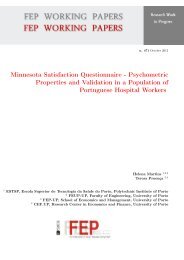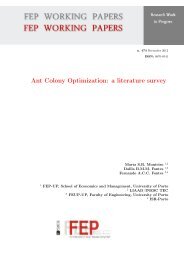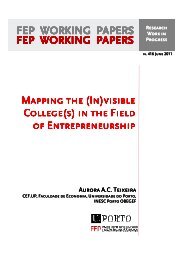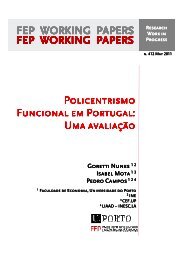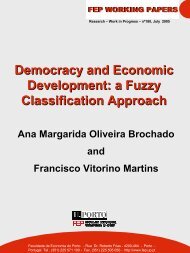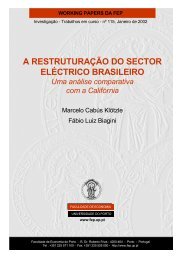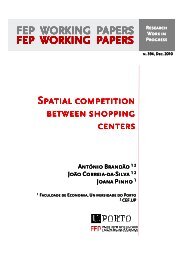Capa wps - FEP - Working Papers - Universidade do Porto
Capa wps - FEP - Working Papers - Universidade do Porto
Capa wps - FEP - Working Papers - Universidade do Porto
Create successful ePaper yourself
Turn your PDF publications into a flip-book with our unique Google optimized e-Paper software.
Andersen (1994) mentions the contribution of the marginalist revolution, the Keynesian revolution<br />
and the post-war formalist revolution to the disappearance of those remote evolutionary<br />
perspectives. Nelson and Winter (2002) identifies as the central factor responsible for the vanish of<br />
many evolutionary analogies in the early post war period the increasing focus of neoclassical<br />
economic theory on equilibrium conditions.<br />
This historical outcome did not emerge only from external factors as the <strong>do</strong>minance of the<br />
neoclassical paradigm (Andersen, 1997). Indeed, there are fundamental intrinsic difficulties also<br />
responsible for it such as the fact that the product of evolutionary processes has very little<br />
predictability, which may block the falsification of evolutionary theorizing; the impression of<br />
eclecticism imposed by the “synthetic character of the evolutionary mechanism which forces<br />
evolutionary-economic theories to transgress the borders of different social-sciences disciplines”<br />
(Andersen, 1997: 2). But, according to Andersen, the most important reason for the failure of the<br />
old evolutionary perspectives in economics corresponds to what he calls a ‘tool problem’: those old<br />
visions could not be supported by adequate analytic tools.<br />
Evolutionary ideas remained in the sha<strong>do</strong>w 10 until the publication of Armen Alchian’s article in<br />
1950. 11 Alchian (1950) argued that the assumption of maximizing behaviour by the firm was<br />
refutable. He proposed the existence of selection processes ensuring the survival of the more<br />
profitable firms, even if firms <strong>do</strong> not attempt to maximize profits. Friedman (1953) modified<br />
Alchian’s ideas arguing that natural selection was a foundation for assuming that agents act ‘as if’<br />
they maximize, independently of what is their effective behaviour. For Friedman, the evolutionary<br />
processes conduct to an evolutionary optimum. Penrose (1952) treated some crucial issues about the<br />
relationship between economics and biology, which are still in agenda. She advised caution in what<br />
concerns the use of biological metaphors, criticising Alchian and others of ignoring a fundamental<br />
characteristic of human activity in the economic world: the deliberative and calculative behaviour.<br />
Hodgson (1999) identifies other contributions that marked in a certain sense a return to biologic<br />
analogies in economics dating back Hayek (1967) and Becker (1976). The first invoked some<br />
evolutionary references. The second presented a model within a neoclassical format but suggesting<br />
genetic determinism in human behaviour.<br />
10 To justify this obscurantism Hodgson points to internal problems in biology such as Darwin’s failure in explaining<br />
the heredity’s mechanisms and the source of organisms’ variation (a gap only eliminated after the neo-Darwinian<br />
synthesis of Mendelian genetics after 1940). But he also identifies the role of some ideological perspectives with racist<br />
and sexist conclusions, abusively drawn from a “biologically-grounded social science” (Hodgson, 1999: 100). At the<br />
same time positivism was becoming stronger. By the 1920s, logical positivism appeared as the prevailing conception of<br />
science (Hodgson, 1999).<br />
11 By this time a new Darwinian biology had emerged (during the 1940s) as the outcome of a synthesis between the<br />
theory of natural selection and Mendelian genetics. Also, Crick and Watson discovered the structure of DNA in 1953<br />
(Hodgson, 1999).<br />
9



